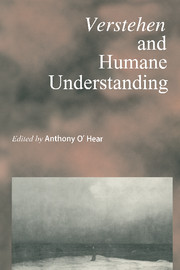Book contents
- Frontmatter
- Contents
- Notes on Contributors
- Preface
- ‘Two Cultures’ Revisited
- Rational and Other Animals
- Vico and Metaphysical Hermeneutics
- Three Major Originators of the Concept of Verstehen: Vico, Herder, and Schleiermacher
- Weber's Ideal Types as Models in the Social Sciences
- Verstehen, Holism and Facism
- Interpretation in History: Collingwood and Historical Understanding
- The Meaning of the Hermeneutic Tradition in Contemporary Philosophy
- Science and Psychology
- To Mental Illness via a Rhyme for the Eye
- Can There be an Epistemology of Moods?
- Feeling and Cognition
- Believing in order to Understand
- Data and Theory in Aesthetics: Philosophical Understanding and Misunderstanding
- Anti-Meaning as Ideology: The Case of Deconstruction
- Perictione in Colophon
- Index of Names
Believing in order to Understand
Published online by Cambridge University Press: 17 May 2010
- Frontmatter
- Contents
- Notes on Contributors
- Preface
- ‘Two Cultures’ Revisited
- Rational and Other Animals
- Vico and Metaphysical Hermeneutics
- Three Major Originators of the Concept of Verstehen: Vico, Herder, and Schleiermacher
- Weber's Ideal Types as Models in the Social Sciences
- Verstehen, Holism and Facism
- Interpretation in History: Collingwood and Historical Understanding
- The Meaning of the Hermeneutic Tradition in Contemporary Philosophy
- Science and Psychology
- To Mental Illness via a Rhyme for the Eye
- Can There be an Epistemology of Moods?
- Feeling and Cognition
- Believing in order to Understand
- Data and Theory in Aesthetics: Philosophical Understanding and Misunderstanding
- Anti-Meaning as Ideology: The Case of Deconstruction
- Perictione in Colophon
- Index of Names
Summary
The theme of this season of lectures is hermeneutics, Verstehen and humane understanding. It is my contention in this paper that long before Droysen or Dilthey, Windelband or Rickert came up with the notion of cultural science (Geisteswissenschafte), it had been flourishing in the scholastic tradition of theology and philosophy of religion, though I am not sure that its practitioners would thank me for saying so.
The Christian Church was forced into philosophy from an early date in face of criticism of its doctrines. A solid reasoned defence was put up by Tertullian, Clement of Alexandria, Origen, Basil, Gregory of Nazianzus, Gregory of Nyssa, and, above all, by Augustine. At first the Fathers of the Church were mainly on the defensive, attempting to show that, even if the faith is not a product of reason, it is not contrary to reason. From this they moved to the more ambitious project of making faith intelligible as far that is possible in view of the fact that it cannot be arrived at by reason alone but is revealed through a prophet. The leading proponents of this view were Saints Augustine, Anselm and Thomas Aquinas.
Initially, at least, they were hermeneutic. They had no intention of attempting to explain or prove (erklären). Their aim was to make as intelligible as possible the mysteries of faith (Verstehen). Later they thought, in a curious way, they could prove the validity of Christian doctrine in a deductive and scientific manner, an absurdity that I shall not consider.
- Type
- Chapter
- Information
- Verstehen and Humane Understanding , pp. 223 - 234Publisher: Cambridge University PressPrint publication year: 1997

